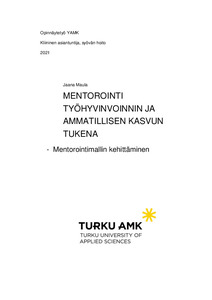Mentorointi työhyvinvoinnin ja ammatillisen kasvun tukena
Maula, Jaana (2022)
Maula, Jaana
2022
All rights reserved. This publication is copyrighted. You may download, display and print it for Your own personal use. Commercial use is prohibited.
Julkaisun pysyvä osoite on
https://urn.fi/URN:NBN:fi:amk-202203143506
https://urn.fi/URN:NBN:fi:amk-202203143506
Tiivistelmä
Hoitotyöntekijöiden työhön sitoutumisen edistäminen, työhyvinvointi ja ammatillinen kasvu ovat tärkeitä tavoitteita terveydenhuollon organisaatioissa. Motivoituneella, osaavalla ja hyvinvoivalla hoitotyöntekijällä on positiivisia vaikutuksia koko organisaation toimintaan. Uuden työntekijöiden kohdalla näitä tavoitteita voidaan vahvistaa muun muassa perehdytystä seuraavan mentoroinnin avulla.
Tämän kehittämisprojektina toteutetun opinnäytetyön tavoitteena on edistää työssä tapahtuvaa oppimista ja osaamisen kehittymistä sekä tukea työhön sitoutumista. Tarkoituksena oli luoda mentorointimalli, jota voidaan hyödyntää työhyvinvoinnin, ammatillisen kasvun ja perehdytyksen kehittämisessä.
Kehittämisprojekti toteutettiin kolmessa vaiheessa, jossa ensimmäisessä vaiheessa määriteltiin mentorointiin liittyviä käsitteitä kirjallisuuskatsauksen avulla. Toisessa vaiheessa selvitettiin lähijohtajien näkemyksiä mentoroinnista ja mentorointimallista kahden asiantuntijapaneelikierroksen avulla. Kolmannessa vaiheessa mentorointimalli viimeisteltiin paneelikierrosten perusteella ja luotiin mentorointimallille implementointisuunnitelma. Osastonhoitajat ja apulaisosastonhoitajat (N=22) muodostivat asiantuntijapaneelin, jonka avulla luotiin mentorointimalli. Aineistonkeruumenetelmänä toimi puolistrukturoitu sähköinen kyselylomake.
Lähijohtajat pitivät mentorointimallia tarpeellisena, joka auttaa mentoroinnin käyttöönotossa. Mentoroinnin toteuttaminen onnistuneesti tarvitsee riittävät aikaresurssit, sekä mentorointiin sitoutuneet aktorin, mentorin ja esihenkilön. Laadukkaalla ja systemaattisella mentorointimallilla
voidaan lisätä työtyytyväisyyttä, työhön sitoutumista ja ammatillista kasvua. Promoting commitment, well-being, and professional growth of nurses are important goals in the healthcare organizations. A motivated, competent and well-being nurse has a positive effect on the entire organization. In the case of a new employee, these goals can be strengthened, for example, through mentoring programs after the orientation.
This thesis was carried out as a development project. The goal of the thesis was to promote learning and competence development at work, as well as to support commitment to work. The purpose was to create a mentoring model that could be used to develop the well-being, professional growth, and support after the orientation.
The development project was carried out in three phases. In the first phase, the concepts of mentoring were defined through a literature review. In the second phase, the views of front-line managers about mentoring were studied in two Delphi panel rounds. In the third round, the formed model was finalized, and the implementation plan was created. The front-line managers (N=22) formed an expert panel to provide input for the actual mentoring model. The data collection method in the Delphi rounds was a half structured electronic questionnaire.
The front-line managers considered the mentoring model to be important and it helps to introduce mentoring. However, successful mentoring requires sufficient resources as well as a committed mentor, mentee, and organization. A high-quality and systematic mentoring model can increase job satisfaction, commitment to work, and professional growth.
Tämän kehittämisprojektina toteutetun opinnäytetyön tavoitteena on edistää työssä tapahtuvaa oppimista ja osaamisen kehittymistä sekä tukea työhön sitoutumista. Tarkoituksena oli luoda mentorointimalli, jota voidaan hyödyntää työhyvinvoinnin, ammatillisen kasvun ja perehdytyksen kehittämisessä.
Kehittämisprojekti toteutettiin kolmessa vaiheessa, jossa ensimmäisessä vaiheessa määriteltiin mentorointiin liittyviä käsitteitä kirjallisuuskatsauksen avulla. Toisessa vaiheessa selvitettiin lähijohtajien näkemyksiä mentoroinnista ja mentorointimallista kahden asiantuntijapaneelikierroksen avulla. Kolmannessa vaiheessa mentorointimalli viimeisteltiin paneelikierrosten perusteella ja luotiin mentorointimallille implementointisuunnitelma. Osastonhoitajat ja apulaisosastonhoitajat (N=22) muodostivat asiantuntijapaneelin, jonka avulla luotiin mentorointimalli. Aineistonkeruumenetelmänä toimi puolistrukturoitu sähköinen kyselylomake.
Lähijohtajat pitivät mentorointimallia tarpeellisena, joka auttaa mentoroinnin käyttöönotossa. Mentoroinnin toteuttaminen onnistuneesti tarvitsee riittävät aikaresurssit, sekä mentorointiin sitoutuneet aktorin, mentorin ja esihenkilön. Laadukkaalla ja systemaattisella mentorointimallilla
voidaan lisätä työtyytyväisyyttä, työhön sitoutumista ja ammatillista kasvua.
This thesis was carried out as a development project. The goal of the thesis was to promote learning and competence development at work, as well as to support commitment to work. The purpose was to create a mentoring model that could be used to develop the well-being, professional growth, and support after the orientation.
The development project was carried out in three phases. In the first phase, the concepts of mentoring were defined through a literature review. In the second phase, the views of front-line managers about mentoring were studied in two Delphi panel rounds. In the third round, the formed model was finalized, and the implementation plan was created. The front-line managers (N=22) formed an expert panel to provide input for the actual mentoring model. The data collection method in the Delphi rounds was a half structured electronic questionnaire.
The front-line managers considered the mentoring model to be important and it helps to introduce mentoring. However, successful mentoring requires sufficient resources as well as a committed mentor, mentee, and organization. A high-quality and systematic mentoring model can increase job satisfaction, commitment to work, and professional growth.
